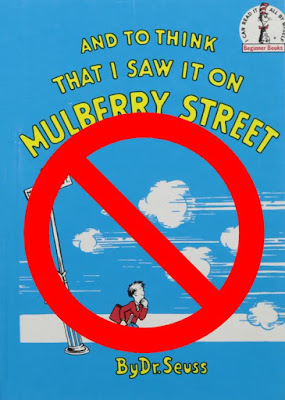March 4, 2021
Today we look at three stories, going backwards in time. This might be a good day to review an entry in QB 325: “going to hell in a handbasket.”
👉 In case you missed it, six Dr. Seuss books – including And to Think That I Saw It on Mulberry Street and If I Ran the Zoo – will no longer published because of racist and insensitive imagery, according the business that preserves and protects the author’s legacy (those last 9 words are certainly ironic – the business that preserves and protects the author’s legacy is censoring and banning his books).
In And to Think That I Saw It on Mulberry Street, an Asian person is portrayed wearing a conical hat, holding chopsticks, and eating from a bowl. If I Ran the Zoo includes a drawing of two bare-footed African men wearing what appear to be grass skirts with their hair tied above their heads.
“These books portray people in ways that are hurtful and wrong,” Dr. Seuss Enterprises said. “Ceasing sales of these books is only part of our commitment and our broader plan to ensure Dr. Seuss Enterprises’ catalog represents and supports all communities and families.”
Numerous other popular children’s series have been criticized in recent years for alleged racism. Babar’s Travels was removed from the shelves of a British library in 2012 because of its alleged stereotypes of Africans. Critics have faulted the Curious George books for their premise of a white man bringing home a monkey from Africa. And Laura Ingalls Wilder’s portrayals of Native Americans in her Little House On the Prairie novels have been faulted so often that the American Library Association removed her name in 2018 from a lifetime achievement award it gives out each year.
If you don’t have a copy of Mulberry Street – I checked Barnes & Noble, and they are out of stock – you may want to check Amazon (6 offerings) or eBay (621 offerings). Here are two screen capture with prices:
👉 Ray Bradbury published Fahrenheit 451 in 1953. The novel presents a future American society where books are outlawed and “firemen” burn any that are found. The book’s tagline explains the title as “the temperature at which book paper catches fire, and burns.” The lead character, Guy Montag, is a fireman who becomes disillusioned with his role of censoring literature and destroying knowledge, eventually quitting his job and committing himself to the preservation of literary and cultural writings. In a 1956 radio interview, Bradbury said that he wrote Fahrenheit 451 because of his concerns at the time (during the McCarthy era) about the threat of book burning and censorship in the United States.
 |
| First edition cover, 1953. |
In January 1967, Fahrenheit 451 was censored by its publisher, Ballantine Books with the release of the “Bal-Hi Edition” aimed at high school students. Among the changes made by the publisher were the censorship of the words “hell,” “damn,” and “abortion,” and the modification of seventy-five passages. For a while both the censored and uncensored versions were available concurrently but by 1973 Ballantine was publishing only the censored version. This continued until 1979 when it came to Bradbury’s attention and Bradbury demanded that Ballantine Books withdraw that version and replace it with the original, and in 1980 the original version once again became available.
Fahrenheit 451 has occasionally been banned, censored, or redacted in some schools at the request of parents or teaching staff either unaware of or indifferent to the inherent irony in such censorship. In 1992, Venado Middle School in Irvine, California, gave copies of Fahrenheit 451 to students with all “obscene” words blacked out. In 2006, parents of a 10th-grade high school student in Montgomery County, Texas, demanded the book be banned from their daughter’s English class reading list. Their daughter was assigned the book during Banned Books Week, but stopped reading several pages in due to what she considered the offensive language and description of the burning of the Bible.
The irony of that last move of against Fahrenheit 451 is that Banned Books Week is an annual awareness campaign promoted by the American Library Association and Amnesty International, which celebrates the freedom to read, draws attention to banned and challenged books, and highlights persecuted individuals. Held during the last week of September since 1982, the campaign “stresses the importance of ensuring the availability of those unorthodox or unpopular viewpoints to all who wish to read them” and the requirement to keep material publicly available so that people can develop their own conclusions and opinions [emphasis mine].
With And To Think That I Saw It On Mulberry Street, and Barbar’s Travels, and Laura Ingalls Wilder’s Little House On the Prairie novels censored, this year’s event – September 19-25 – seems rather hypocritical.
👉 On May 10, 1933, university students in 34 university towns across Germany burned over 25,000 books. The works of Jewish authors like Albert Einstein and Sigmund Freud went up in flames alongside blacklisted American authors such as Ernest Hemingway and Helen Keller, while students gave the Nazi salute. In Berlin 40,000 people gathered to hear German Minister of Public Enlightenment and Propaganda Joseph Goebbels give a speech declaring, “the era of extreme Jewish intellectualism is now at an end . . . It is to this end that we want to educate you . . . And thus you do well in this midnight hour to commit to the flames the evil spirit of the past.” Newspaper coverage called the “Action against the Un-German Spirit” a success. The Nazi war on “un-German” individual expression had begun.
The book burnings were not limited to Berlin, nor to that night. For weeks before and after, a number of German universities staged large burnings of unwanted texts. The president of the University of Freiburg, Martin Heidegger, addressed students with the words: “Flames, speak to us, illuminate us, show us the path from which there is no turning back! Flames alight, hearts burn!”
In 1933 books are burned. In 2021 books are banned. What is the difference?
👉 With all of that, let’s close with a song written and sung by Michael Eldridge, “When I Go Home.” It is a day believers in Jesus Christ are looking forward to!
-30-





No comments:
Post a Comment